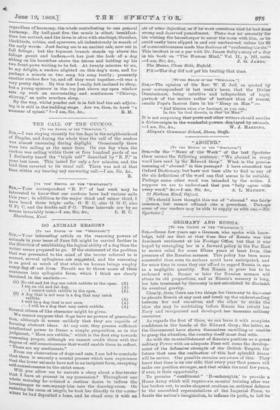DO ANIMALS REASON?
[To T1110 EDITOR or TDB SPECTATOR.") SIR,—Your interesting article on the reasoning powers of animals in your issue of June 5th might be carried farther in
the direction of establishing the logical ability of a dog than the writer seems prepared to go. If the statement of the problem that was presented to the mind of the terrier referred to is correct, several syllogisms-are suggatted, and the reasoning is as good as much of that which we human beings employ every day of our lives. Permit me to throw some of these Sentences into syllogistic form, which I think are clearly involved in the analysis :— (1) No old and fat dog can catch rabbits in the open: (E) I am an old and fat clog. (A) . • . I cannot catch rabbits in the open. (E) (2) A dog that is not seen is a dog that may catch rabbits. I will be a dog that is not seen. I will be a dog that may catch rabbits. (A Several others of like character might be given. We cannot suppose that dogs have no powers of generalisa- tion, although it seems unlikely that they are capable of forming abstract ideas. At any rate, they possess sufficient intellectual power to frame a simple proposition, as in the judgment, "Here are rabbits," which is the first step towards reasoning proper, although we cannot credit them with the degree of self-consciousness that would enable them to reflect, " These are my sentiments." From my observation of doge and cats; I am led to conclude that there is scarcely a mental process which men experience
that the lower animals have not in an incipient form, excepting self-consciousness in the strict sense. Will you allow in to narrate a story about a fox-terrier that I have at present in my possession P Throughout one- whole morning he. evinced R. restless desire to induce the housekeeper to accompany him into the drawing-room: On entering the room at length, he took her directly to the corner' Where he had deposited a .bone, and ho stood over it with an aft of utter dejection, at if lie were conscious that he had done *tong and deserved punishment. Therawas no necessity fbr his wishing the housekeeper to enter the room with him, as ate' could eaeily have slipped in and out unobserved, unless his MI of comicientiousness made him desirous of "confessing his.sirt" This incident is on a par with Dr. James Sully's story of a diems in his book on " The Human Mind," Vol. II,, p. 161, note.
P.S.-&,..Thei.dog did not get his beating that time.










































 Previous page
Previous page